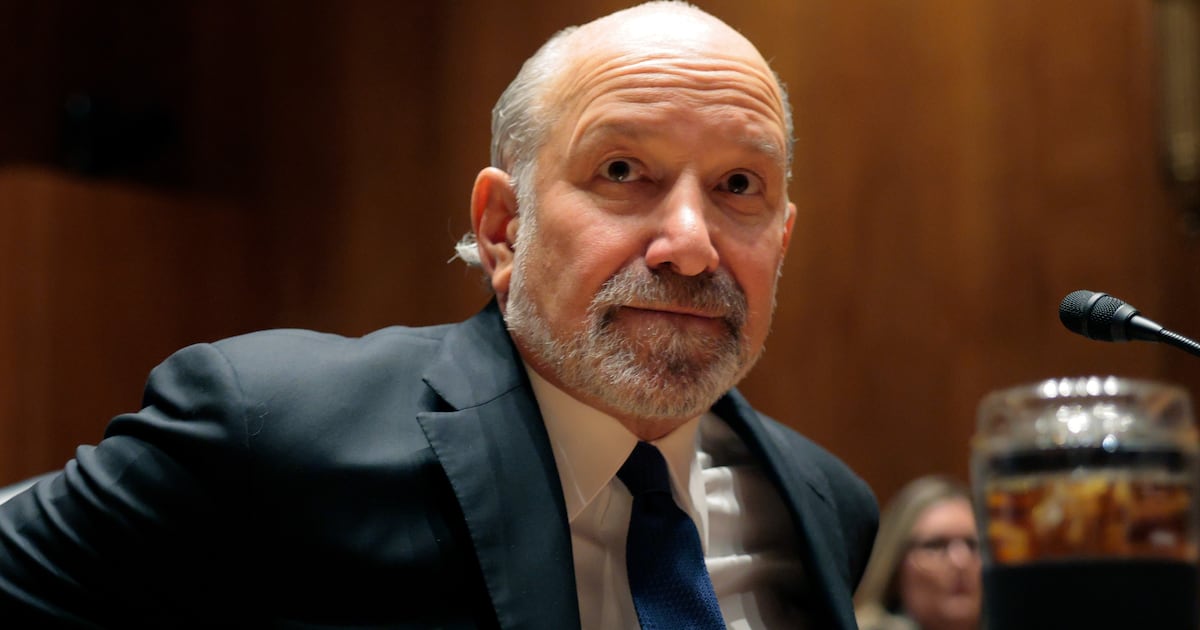The heads of U.S. intelligence are ducking comment after President Trump indicated that he’s more inclined to believe Vladimir Putin’s denials of election interference than their agencies’ joint assessments.
“My people came to me, [Director of National Intelligence] Dan Coats came to me and some others, they said they think it’s Russia. I have President Putin, he just said it’s not Russia. I will say this: I don’t see any reason why it would be,” Trump said beside a confident, brazen Russian leader in Helsinki on Monday.
In January 2017, the National Security Agency, Central Intelligence Agency, and the Federal Bureau of Investigation jointly assessed that the Kremlin launched a concerted and multifaceted effort to sway the 2016 presidential election. Many of the assessment’s particulars concern surreptitious social-media manipulation and Russian intelligence digitally stealing thousands of emails and other material from servers associated with the Democratic party. In two indictments, most recently on Friday, special prosecutor Robert Mueller brought specific, detailed charges against 25 Russian nationals he alleges were involved in those efforts.
Asked if newly installed NSA Director Paul Nakasone would resign given Trump’s belief that Putin is a more reliable source of information than U.S. intelligence, a spokesperson for the NSA, Christopher Augustine, deferred comment to the Office of National Intelligence and the White House.
Tim Barrett, a spokesman for the CIA, said the agency declined comment when asked if Gina Haspel, whose contentious CIA directorship Trump strongly supported, would resign.
Coats, hours after Trump’s press conference with Putin, put out a statement defending his own intelligence community’s relevance.
“The role of the Intelligence Community is to provide the best information and fact-based assessments possible for the President and policymakers. We have been clear in our assessments of Russian meddling in the 2016 election and their ongoing, pervasive efforts to undermine our democracy, and we will continue to provide unvarnished and objective intelligence in support of our national security,” Coats said.
A spokesman for Coats, Brian Hale, told The Daily Beast the statement was “all we are offering on the matter.”
The FBI as well declined comment on whether director Christopher Wray would resign, said spokesperson Carol Cratty.
Even the most partisan and pro-Trump congressional assessment of the 2016 election, provided by the House intelligence committee Republicans, still concluded that “Russian state actors” were “responsible for the dissemination of documents and communications stolen” from the Democrats. The Senate intelligence committee’s version went substantially further in bolstering the joint NSA-CIA-FBI assessment.
A former CIA officer and current GOP congressman on the intelligence committee, Will Hurd, tweeted that Trump "is wrong," and said: "I've seen Russian intelligence manipulate many people over my professional career and I never would have thought that the US President would become one of the ones getting played by old KGB hands," a reference to Putin's resume.
Adam Schiff, the top Democrat on the House intelligence committee, tweeted that Trump’s “cowardly and shameful” acceptance of Putin’s denial represents a “green light” for Putin “to interfere in [the] 2018” midterm elections. Mark Warner, the top Democrat on the Senate intelligence committee, said that to “side with Putin over America’s military and intelligence leaders is a breach of [Trump’s] duty to defend our country against its adversaries.
Former CIA chief John Brennan railed against Trump, writing that the president’s unwillingness to blame Russia 2016 election interference “rises to & exceeds the threshold of “high crimes & misdemeanors.” He added: “It was nothing short of treasonous.”
“In over 30 years of government service, including time at the White House, Pentagon and intelligence community, I have never seen a sorrier performance by a senior U.S. official,” said one former senior U.S. official who declined to be quoted by name. “To call it cringe-worthy would be to unnecessarily sugarcoat the impact.”
The day before the summit, Ambassador Jon Huntsman, the former GOP governor of Utah whom Trump appointed as the U.S. envoy to Moscow, told Meet The Press that the “bigger picture” after Mueller’s last round of indictments “is we need to hold the Russians accountable for what they did.” Huntsman sat silently with the rest of the president’s retinue in Helsinki as Trump obviated the prospects for that accountability. His daughter, the Fox News anchor Abby Huntsman, tweeted: “No negotiation is worth throwing your own people and country under the bus.”
A Brookings Institution scholar focusing on translatlantic relations, Thomas Wright, told reporters after what he called a “shocking” summit that “everyone in the administration has to really reflect over the next week or two and ask themselves if they stand a better chance of constraining President Trump from within or from without.”
Kimberly Dozier contributed reporting.






